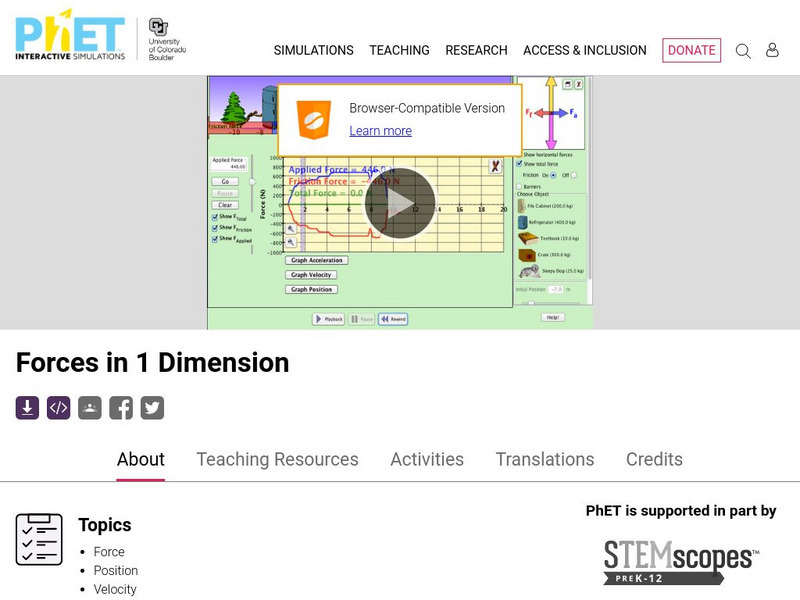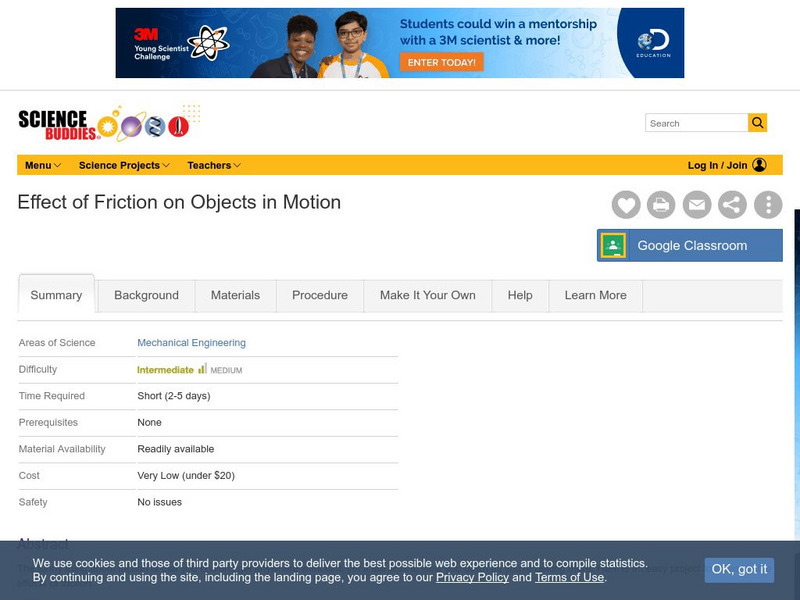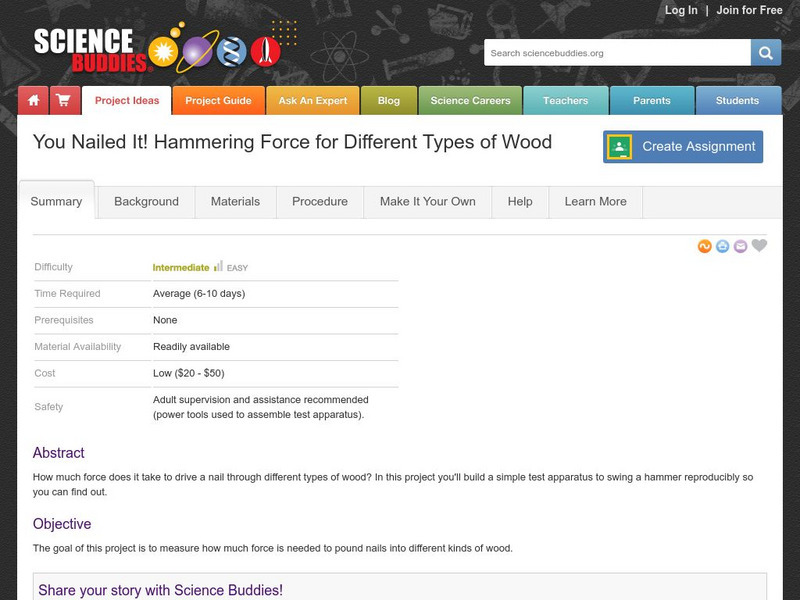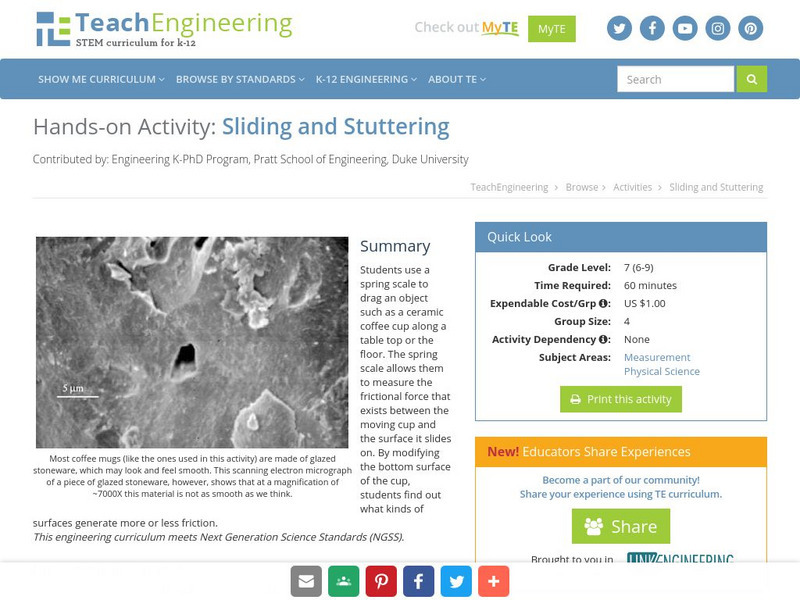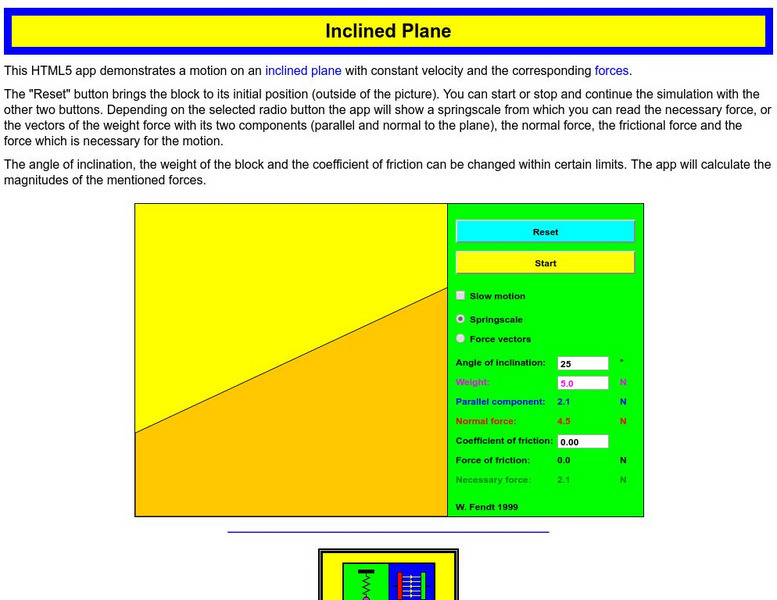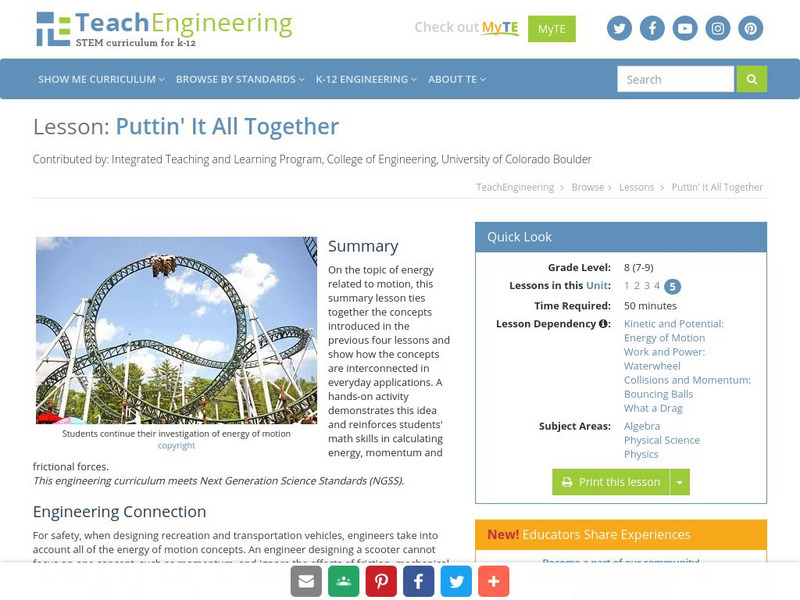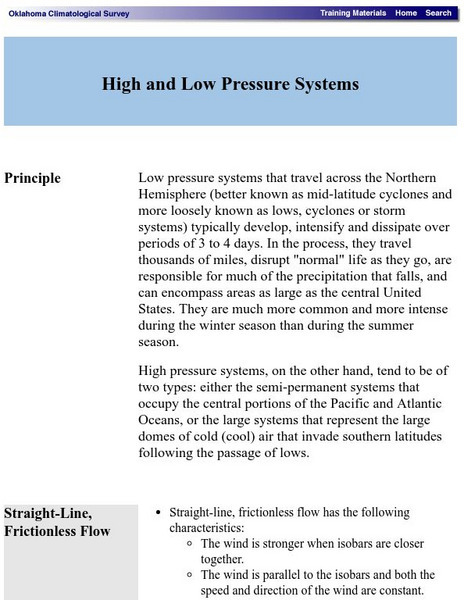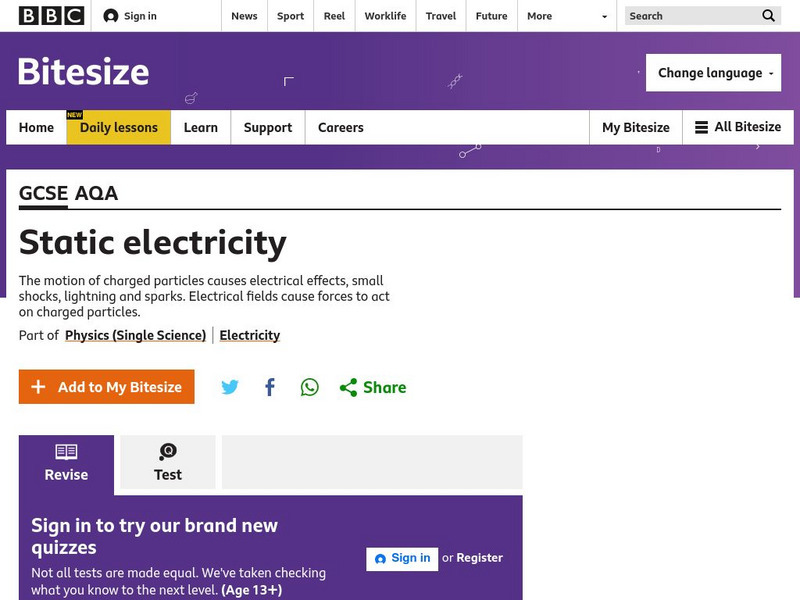TeachEngineering
Teach Engineering: Imagine Life Without Friction
Students are introduced to the concept of inertia and its application to a world without the force of friction acting on moving objects. When an object is in motion, friction tends to be the force that acts on this object to slow it down...
Science Buddies
Science Buddies: Explore the Forces of Friction
We all recognize what friction is, but do you really understand what causes it? This project focuses on friction, its causes and forces and specifically how it affects how fast you can slip down slides.
University of Colorado
University of Colorado: Ph Et Interactive Simulations: Forces in One Dimension
Use this simulation to see the results of applying a force to move an object. Analyze forces and friction using graphs.
University of Colorado
University of Colorado: Ph Et Interactive Simulations: Forces in 1 Dimension
Explore the forces at work when you try to push a filing cabinet. Create an applied force and see the resulting friction force and total force acting on the cabinet. Charts show the forces, position, velocity, and acceleration vs. time....
Science Buddies
Science Buddies: Effect of Friction on Objects in Motion
The funny thing about friction is that you couldn't get anywhere without it, yet it still acts to slow you down as you're getting there. Here is an easy project to measure the effects of friction.
University of Colorado
University of Colorado: Ph Et Interactive Simulations: Forces and Motion
Explore the forces at work when you try to push a filing cabinet. Create an applied force and see the resulting friction force and total force acting on the cabinet. Charts show the forces, position, velocity, and acceleration vs. time....
Science Buddies
Science Buddies: You Nailed It! Hammering Force for Different Types of Wood
This Science Buddies project explains how to build a mechanism that will reproducibly swing a hammer so you can determine the amount of force needed to hammer a nail through various densities of wood. The Science Buddies project ideas...
University of Colorado
University of Colorado: Ph Et Interactive Simulations: Forces and Motion: Basics
See how forces affect various items that are pushed or pulled.
University of Alaska
University of Alaska Fairbanks: Static and Kinetic Friction
Explains what static and kinetic friction are, what their coefficients of friction are in different scenarios, and how these concepts are applied when looking at automobile braking distances and vehicle control when driving.
CK-12 Foundation
Ck 12: Friction
[Free Registration/Login may be required to access all resource tools.] In this module, students learn what causes friction, what factors affect friction, and how it is calculated.
TeachEngineering
Teach Engineering: Red Light, Green Light
Building upon their understanding of forces and Newton's laws of motion, students learn about the force of friction, specifically with respect to cars. They explore the friction between tires and the road to learn how it affects the...
Khan Academy
Khan Academy: Frictional Forces on Mobility Walkers
This passage will test your knowlege on normal forces.
Physics Classroom
The Physics Classroom: Newton's Laws: Finding Individual Forces
Through illustrated examples and interactive practice problems, students find the value of forces acting upon objects using force equations.
New York University
New York Univ.: Tandon School of Engineering: Static and Kinetic Friction [Ppt]
Explains what static and kinetic friction are and discusses the coefficient of friction for different situations. Presents two simple lab experiments and real-life examples of friction in action.
Science Struck
Science Struck: Static Friction vs. Kinetic Friction: The Differences
Teaches what friction force is, the difference between static and kinetic friction, and how friction force is calculated.
TeachEngineering
Teach Engineering: Sliding and Stuttering
Students use a spring scale to drag an object such as a ceramic coffee cup along a table top or the floor. The spring scale allows them to measure the frictional force that exists between the moving cup and the surface it slides on. By...
Physics Classroom
The Physics Classroom: Newton's Second Law of Motion
Learn more about finding acceleration through the practices found in this lesson. "The process of determining the acceleration of an object demands that the mass and the net force are known." Check out this comprehensive site.
Walter Fendt
Walter Fendt: Inclined Plane
This site is an interactive app of an inclined plane showing the effect of the angle, the weight of the block, and the friction as a block is pulled up an incline.
TeachEngineering
Teach Engineering: Puttin' It All Together
On the topic of energy related to motion, this summary lesson plan is intended to tie together the concepts of work, power, collisions, momentum and drag. A hands-on activity demonstrates this idea and reinforces students' math skills in...
Oklahoma Mesonet
University of Oklahoma: High and Low Pressure
This University of Oklahoma meteorology tutorial explores both high and low pressure systems--how they form and the different forms they take.
CK-12 Foundation
Ck 12: Physics: Newton's Laws Study Guide
This study guide on Newton's Laws covers key terms, the three laws, free body diagrams, friction coefficients and tension. Includes equations and an example problem with solution. It is available for download with free registration.
BBC
Bbc: Gcse Bitesize: Static Electricity
This lesson focuses on static electricity, including how particles can be charged by friction, and electrical forces and why they repel or attract each other. Includes a link to a test.
Center of Science and Industry
Cosi Columbus: Hover Cup
Science experiment in which you make a hovercraft, a machine that uses compressed air to do work, from a paper cup. Includes full list of materials, procedures, and scientific explanation of how air flow can minimize friction and cause...
Physics Classroom
The Physics Classroom: Newton's First Law of Motion
A clear explanation of Newton's First Law of Motion, the law of inertia, with diagrams and real-world examples. Useful for both students and teachers. Written by a high school physics teacher.


